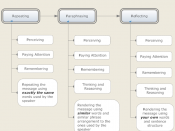1. IntroductionAchieving success in workplace is closely associated with the ability to communicate effectively, both in workplace and with outsiders. Unlike in the past, today we face a high volatile world where everything is in a state of flux. Most of the changes associated with this transformation revolve around the processing and communication of information. A number of communication challengers exist at workplaces. All these challengers call for effectiveness and efficiency in communication (Raman & Singh, 2006).
Communication can be defined as a function of express, impress and intention. Communication is the process of exchanging information, usually through a common system of symbols.
According to Henry Mintzberg (as cited in Locker, 1998), managers have three basic jobs: to collect and convey information, to make decisions and to promote interpersonal unity. Every one of those jobs is carried out through communication. Effective managers are able to use a wide variety of media and strategies to communicate.
Speaking and listening are the communication skills we use most (Nanayakkara, 1996). In oral presentations, the audience comprises individual listeners and also to address people effectively, the presenter needs to know the requirements of the audience and it is a must to listen to the audience. Therefore, being a good listener and an effective presenter are two key talents a manager must sharpen as they can be treated as twin skills.
2. Being a Good ListenerListening is an extremely important and surprisingly difficult communication skill in business. Various studies show that business people spend from 45 to 63percent of their time listening. Listening is crucial to building trust (Locker, 1998). Managers need to be effective listeners in various situations.
Listening is the communication channel we use most frequently, yet surveys show that listening skills are the least developed.
The good managers are good listeners. Managers...


